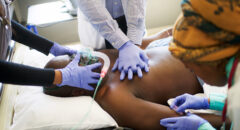 If you've had a heart attack, you're probably wondering how your life is going to change.
If you've had a heart attack, you're probably wondering how your life is going to change.
It depends on how severe your heart attack was, how it was treated, and lifestyle changes that you make. In many ways, it's up to you! Your life can be even healthier and more active than before. Work with your healthcare provider on a plan.
Recovering and Preventing Future Problems
The first step is to work with your healthcare provider to find the cause of your heart attack. This may have been done while you were in the hospital. You will have likely had various tests of your heart and blood to find out what risk factors caused the heart attack. These tests might have included electrocardiograms, echocardiogram, stress test, coronary catheterization and angiogram, and numerous blood tests. Talk with your provider about ways to reduce the risk for another heart attack.
After a first heart attack, the risk of another heart attack increases 2- or 3-fold. That doesn't mean, though, that the second heart attack has to happen. There are many strategies you and your provider can use to make your life healthy:
Stop smoking.
Change your diet.
Become more physically active and lose weight, if needed.
Control high blood pressure, high cholesterol, and diabetes if you have these conditions.
Undergo angioplasty or surgery.
Take your medicine.
Maintain regular follow-up with your healthcare provider.
Make Healthy Choices
How can you move toward a healthier lifestyle?
Stop smoking. If you smoke, ask your provider about programs that help you stop.
Exercise every day. Exercise strengthens your heart muscle so it can pump blood more easily and strengthens other muscles so the heart doesn't have to work so hard. It can help you lose weight, lower your blood pressure, decrease stress, decrease your cholesterol levels, and reduce the risk of dying from another heart attack. Focus on aerobic exercise for an average of 40 minutes a day 3 to 4 days a week. Aerobic exercise—the type that raises your heart rate—can be as easy as a brisk, 30-minute walk. Start slowly and follow your provider's advice Arthritis or other problems may make some exercises challenging. But that doesn't mean you shouldn't be active. Again, your provider can help. If walking is too difficult or painful, try riding a stationary bike or swimming.
Eat heart-healthy. Diet changes can help lower your cholesterol level, weight, and blood pressure. Avoid high saturated fat, trans fat, and high cholesterol foods and shift to a leaner diet higher in fiber and lower in salt. That means more fruits and vegetables, and less dairy, butter, and red meat. Avoid fried foods and make good decisions when eating out. A dietitian or nutritionist can help.
Be active in bed. Don't be afraid of having sex after a heart attack. As with other activity, you may have to start slowly and gradually work into your normal habits. Most people are at higher risk of heart-related problems during sex in the first couple of weeks after a heart attack. However, this risk becomes very small by around 6 weeks after the heart attack. Some of the medicines you may take after a heart attack can affect your interest in sex or the ability to have an erection or orgasm. Talk to your provider about when you can begin to have sex or if you think medicines may be causing problems. It's important to communicate with your partner about your concerns as well.
Take your medicines. You may be taking medicine for your heart as well as for lowering cholesterol, controlling blood pressure, or for diabetes. Make sure you understand when and how to take your medicine, and take it correctly. Talk with your provider if the medicine causes problems for you. Don't change or stop taking medicine on your own.
Reduce stress. Stress can increase your blood pressure, increase your heart rate, and make your heart disease worse. If you are under stress from work or home, get advice on stress reduction techniques or see a counselor for suggestions on how you can reduce your stress or change your response to stressful situations.
Cardiac Rehab
Cardiac rehabilitation programs aim to help people who have had heart attacks or other heart problems make the changes they need for a healthy lifestyle. In a rehab program, health professionals will work with you to show you how to control your blood pressure, stop smoking, change your diet, and start exercising.
The goal of rehab is to form habits that will make and keep you healthy. If your provider hasn't talked with you about a cardiac rehabilitation program, you should ask about it.
Recovering from a heart attack means changing your life in positive ways. The changes don't just reduce your risk and fear of another heart attack. They can also make life healthier and more fun.
Support From Friends and Family
Your family members can help you in your recovery.
For example, your partner can exercise with you and provide support and encouragement. Or, they can join in eating in a healthy diet, encouraging you to complete a rehab program or quit smoking, and reminding you to take medicine.
Family members can also watch your mood. Depression is common after a heart attack. Those close to you should encourage you to get help and call the healthcare provider if they notice changes.
Sometimes family or friends can get in the way of your recovery. For instance, if a family member smokes, it may make it more difficult for you to stop. You might have to stay away from smokers or not allow smoking in your home.
Talking to your friends and family can help identify concerns and areas for improvement. Together, you can find a way to support a healthier lifestyle for you and your heart.
Founded in 1974, the Association of Black Cardiologists, Inc., (ABC) is a nonprofit organization with an international membership of 1,700 health professionals, lay members of the community (Community Health Advocates), corporate members, and institutional members. The ABC is dedicated to eliminating the disparities related to cardiovascular disease in all people of color. Today, the ABC’s public and private partnerships continue to increase our impact in communities across the nation. For more information, visit abcardio.org.






